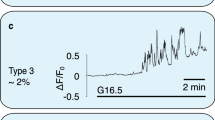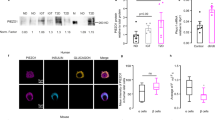Abstract
GLUCOSE stimulates insulin secretion from the pancreatic β-cell by increasing the cytosolic calcium concentration1. It is believed that this increment results mainly from Ca2+ influx through dihydropyridine-sensitive calcium channels because insulin secretion is abolished by dihydropyridine antagonists2 and is potentiated by dihydropyridine agonists3. Glucose may influence Ca2+ influx through these channels in two ways: either by regulating the β-cell membrane potential or by biochemical modulation of the channel itself. The former mechanism is well established. Glucose metabolism, by closing ATP-sensitive K+ channels4, depolarizes the β-cell membrane and initiates Ca2+-dependent electrical activity, with higher glucose concentrations further increasing Ca2+ influx by raising the frequency of action potentials5,6. We show here that glucose metabolism also increases calcium influx directly, by modulating the activity of dihydropyridine-sensitive Ca2+ channels.
This is a preview of subscription content, access via your institution
Access options
Subscribe to this journal
Receive 51 print issues and online access
$199.00 per year
only $3.90 per issue
Buy this article
- Purchase on Springer Link
- Instant access to full article PDF
Prices may be subject to local taxes which are calculated during checkout
Similar content being viewed by others
References
Prentki, M. & Matchinsky, F. M. Physiol. Rev. 67, 1185–1249 (1987).
Malaisse-Lagae, F., Mathias, P. C. F. & Malaisse, W. J. Biochem. biophys. Res. Commun. 123, 1062–1068 (1984).
Henquin, J. C., Schmeer, W., Nenquin, M. & Meissner, H. P. Biochem. biophys. Res. Commun. 131, 980–986 (1985).
Ashcroft, F. M., Harrison, D. E. & Ashcroft, S. J. H. Nature 312, 446–448 (1984).
Henquin, J. C. & Meissner, H. P. Experientia 40, 1043–1052 (1984).
Bozem, M. & Henquin, J. C. Pflugers Arch. ges. Physiol. 413, 147–152 (1988).
Horn, D. R. & Marty, A. J. gen. Physiol. 92, 145–159 (1988).
Rorsman, P. & Trube, G. J. Physiol., Lond. 374, 531–550 (1986).
Plant, T. D. J. Physiol., Lond. 404, 731–747 (1988).
Rorsman, P., Ashcroft, F. M. & Trube, G. Pflugers Archiv. ges. Physiol. 412, 597–603 (1988).
Nowycky, M. C., Fox, A. P. & Tsien, R. W. Nature 316, 440–443 (1985).
Velasco, J. M., Petersen, J. U. H. & Petersen, O. H. FEBS Lett. 213, 366–370 (1988).
Ashcroft, S. J. H. Diabetologia 18, 5–15 (1980).
Niki, I., Ashcroft, F. M. & Ashcroft, S. J. H. FEBS Lett. 257, 361–364 (1989).
Armstrong, D. L. Trends Neurosci. 12, 1–10 (1989).
Author information
Authors and Affiliations
Rights and permissions
About this article
Cite this article
Smith, P., Rorsman, P. & Ashcroft, F. Modulation of dihydropyridine-sensitive Ca2+ channels by glucose metabolism in mouse pancreatic β -cells. Nature 342, 550–553 (1989). https://doi.org/10.1038/342550a0
Received:
Accepted:
Issue Date:
DOI: https://doi.org/10.1038/342550a0
This article is cited by
-
Episodic hormone secretion: a comparison of the basis of pulsatile secretion of insulin and GnRH
Endocrine (2014)
-
Ionic mechanisms in pancreatic β cell signaling
Cellular and Molecular Life Sciences (2014)
-
Subplasmalemmal Ca2+ measurements in mouse pancreatic beta cells support the existence of an amplifying effect of glucose on insulin secretion
Diabetologia (2010)
-
Oscillations of membrane potential and cytosolic Ca2+ concentration in SUR1−/− beta cells
Diabetologia (2004)
-
Pancreatic beta-cells are rendered glucose-competent by the insulinotropic hormone glucagon-like peptide-1(7-37)
Nature (1993)
Comments
By submitting a comment you agree to abide by our Terms and Community Guidelines. If you find something abusive or that does not comply with our terms or guidelines please flag it as inappropriate.



